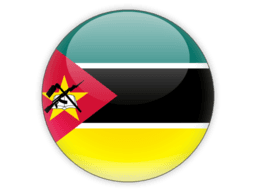
Cities of Mozambique
Discover 50 cities across 11 regions
Cabo Delgado Province(6)
Gaza Province(4)
Inhambane Province(4)
Maputo City(1)
Maputo Province(4)
Nampula(12)
Niassa Province(3)
Mozambique is a country located in southeastern Africa along the Indian Ocean. It is bordered by Tanzania to the north, Malawi, Zambia, and Zimbabwe to the west, South Africa to the south, Eswatini to the southwest, and the Indian Ocean to the east.
Mozambique has a rich history and culture, with a mix of influences from the indigenous peoples, Portuguese colonizers, and other African countries. The official language is Portuguese, but many other languages are spoken including Makhuwa, Sena, and Swahili.
The capital city is Maputo, located in the south of the country. Other major cities include Beira, Nampula, and Quelimane. The country has a population of around 30 million people.
Mozambique is known for its stunning natural beauty, with a long coastline, tropical forests, and diverse wildlife. Some of the most popular tourist destinations include the Bazaruto Archipelago, Gorongosa National Park, and the Quirimbas Archipelago. The country also has a rich cultural heritage, with traditional music, dance, and art.
The economy of Mozambique is largely based on agriculture, with cashews, cotton, sugar, and tobacco being the main exports. The country is also rich in mineral resources, including coal, natural gas, and precious stones. In recent years, Mozambique has seen significant economic growth, with foreign investment increasing in various sectors including mining, infrastructure, and tourism.
When traveling to Mozambique, it is important to keep in mind that the country can be prone to natural disasters, including floods, cyclones, and droughts. It is also recommended to take precautions to prevent malaria and other mosquito-borne diseases.
Telephone Code
258
Local Emergency Phone
Ambulance: 117; Fire: 198; Police: 119
Vaccinations
An International Certificate of Vaccination for yellow fever is required for travelers arriving from countries with a risk of yellow fever transmission and for travelers having transited through the airport of a country with risk of yellow fever transmission. See WHO recommendations. On 21 March 2022, the US Centers for Disease Control and Prevention (CDC) issued a Travel Alert for polio in Africa; Mozambique is currently considered a high risk to travelers for polio; the CDC recommends that before any international travel, anyone unvaccinated, incompletely vaccinated, or with an unknown polio vaccination status should complete the routine polio vaccine series; before travel to any high-risk destination, CDC recommends that adults who previously completed the full, routine polio vaccine series receive a single, lifetime booster dose of polio vaccine.
Climate
Tropical to subtropical
Currency (Code)
Meticais (MZM)
Electricity/Voltage/Plug Type(s)
220 V / 50 Hz / plug types(s): C, F, M
Major Languages
Emakhuwa, Portuguese, Xichangana, Cinyanja, Cisena, Elomwe, Echuwabo, Cindau, Xitswa, other Mozambican languages
Major Religions
Roman Catholic 27.2%, Muslim 18.9%, Zionist Christian 15.6%, Evangelical/Pentecostal 15.3%, Anglican 1.7%
Potable Water
Opt for bottled water
International Driving Permit
Suggested
Road Driving Side
Left
Tourist Destinations
Gorongosa National Park; Maputo (includes Tunduru Botanical Gardens, Cathedral, Fortress, National Money Museum), Maputo Elephant Reserve; Macuti Lighthouse & Shipwreck
Major Sports
Soccer, basketball, volleyball
Cultural Practices
Covering a fist with one's open hand signals "that's enough."
Tipping Guidelines
Tipping is standard practice in Mozambique. Tipping 10% in restaurants and bars is common. Round up taxi fares. Tip bellhops $1 (USD) per bag and hotel housekeeping $1-2 (USD) per day.
Souvenirs
Ritual masks, seashell and bead jewelry, hand woven and dyed fabric goods, carved wooden items, pottery
Traditional Cuisine
Peri peri chicken — grilled or roasted chicken marinated in cumin, garlic, paprika, lemon juice, and bird's eye chilis grilled or roasted and served with a creamy and spicy coconut sauce
Geography
Area
total: 799,380 sq km
land: 786,380 sq km
water: 13,000 sq km
Climate
tropical to subtropical
Natural resources
coal, titanium, natural gas, hydropower, tantalum, graphite
People and Society
Population
32,513,805 (2023 est.)
Ethnic groups
African 99% (Makhuwa, Tsonga, Lomwe, Sena, and others), Mestizo 0.8%, other (includes European, Indian, Pakistani, Chinese) 0.2% (2017 est.)
Languages
Makhuwa 26.1%, Portuguese (official) 16.6%, Tsonga 8.6%, Nyanja 8.1, Sena 7.1%, Lomwe 7.1%, Chuwabo 4.7%, Ndau 3.8%, Tswa 3.8%, other Mozambican languages 11.8%, other 0.5%, unspecified 1.8% (2017 est.)
Religions
Roman Catholic 27.2%, Muslim 18.9%, Zionist Christian 15.6%, Evangelical/Pentecostal 15.3%, Anglican 1.7%, other 4.8%, none 13.9%, unspecified 2.5% (2017 est.)
Population growth rate
2.55% (2023 est.)
Government
Government type
presidential republic
Capital
name: Maputo
Economy
Economic overview
low-income East African economy; mostly rural labor force; natural resource rich; strong South African ties; Islamist terrorism in north endangers newly discovered natural gas; currently in court over massive (possibly unauthorized) debt
Real GDP (purchasing power parity)
$39.351 billion (2021 est.)
Real GDP per capita
$1,200 (2021 est.)
Agricultural products
sugar cane, cassava, maize, milk, bananas, tomatoes, sweet potatoes, rice, sorghum, potatoes
Industries
aluminum, petroleum products, chemicals (fertilizer, soap, paints), textiles, cement, glass, asbestos, tobacco, food, beverages
Exports
$6.404 billion (2021 est.)
Exports - partners
South Africa 16%, India 13%, China 12%, Italy 7%, United Arab Emirates 5%, Germany 5% (2019)
Exports - commodities
coal, aluminum, natural gas, tobacco, electricity, gold, lumber (2019)
Imports
$10.392 billion (2021 est.)
Imports - partners
South Africa 31%, India 18%, China 17% (2019)
Imports - commodities
refined petroleum, chromium, iron, bauxite, electricity (2019)
International Airports in Mozambique
Discover 10 major airports serving Mozambique
Mark Mozambique as Visited
Add Mozambique to your personal travel map and track your journey around the world. Share your adventures and see your progress grow!